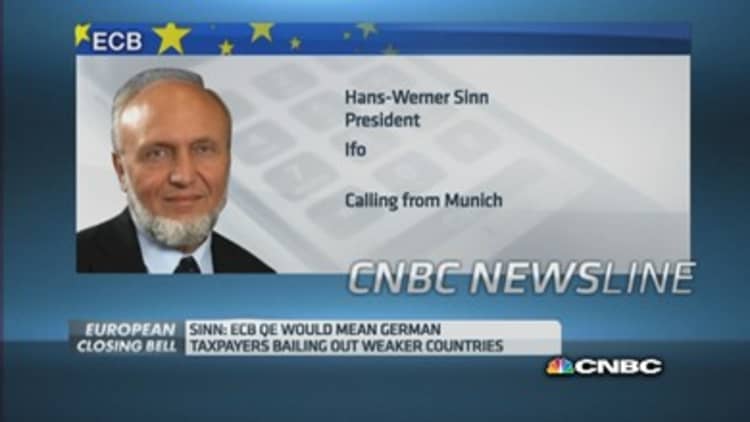Germany's chancellor made a rare public intervention in the debate about money printing by the European Central Bank on Monday, warning it was no substitute for economic reforms in the euro zone.
Speaking to an audience near Frankfurt that included ECB President Mario Draghi, Merkel said any move by the ECB to buy government bonds with new money should not be used as an excuse to put such reforms on the back burner.
"I have only one plea ... and that is aimed at all the representatives of the ECB," Angela Merkel said at the headquarters of German stock exchange operator Deutsche Boerse.

"It must be avoided that any action taken by the ECB in any respect whatsoever could result in the impression that what needs to be done in the fiscal and competitive spheres could be pushed into the background."
Her comments reflect German fears that quantitative easing by the ECB would sponsor spendthrift countries, allowing their governments to avoid needed reforms to labour and other markets.
Read MoreWarning! Volatility may await if ECB launches QE
Merkel was careful not to comment directly on whether the ECB should announce a QE program, as it is widely expected to announce to do on Thursday.
"It can quickly happen that people believe that one (policy) can replace the other," Merkel warned. "That is certainly not possible. The pressure to improve competitiveness in Europe must remain or else nothing, and I really mean nothing, can help us."
German Bundesbank President Jens Weidmann, who was in the audience, remains opposed to QE, for fear that it would leave Germany on the hook for any losses.
The Bundesbank is still seeking safeguards, including a likely move to make national central banks rather than the ECB bear much of the risk for buying the bonds of euro zone states.
Although the Bundesbank's position within the ECB carries huge weight because Germanyis the bloc's biggest economy, its allies are few in number on the 25-strong Governing Council.
The ECB's six-strong Executive Board, at the core of its decision-making, will meet on Tuesday to prepare recommendations for the wider group, including central bankers from all 19 euro zone countries, who gather from Wednesday.
Many in Merkel's political camp are privately critical of proposals for money printing, believing it can do little to lift economic growth or encourage bank lending, but her government would be loath to attempt publicly to put a brake on the ECB.
However, one senior lawmaker from Merkel's conservatives, Norbert Barthle, told Reuters he was "not convinced of the need for a massive program to buy state debt".

